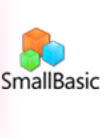| Small Basic 1.0 arrives |
| Written by Alex Denham |
| Thursday, 14 July 2011 |
|
After more than two years of pre-release versions, the most minimal ,NET language, Small Basic, has arrived at a stable release that merits being Version 1.0. Small Basic is designed to bring the fun back into programming through a small and easy to learn programming language, that runs under .NET, with just 15 keywords in the base language. I can’t help thinking that most of you will be of the opinion that programming is fun no matter what language you’re using, and a minority will be choking on your coffee at the thought that programming could be fun under any circumstance, but that’s the idea behind Small Basic. As the name suggests, Small Basic is inspired by the original BASIC but illustrating the fact that this really is a different view of the world, the headline (and only real main) improvement to Small Basic 1.0 is support for the Icelandic language. Obviously that deserves an x.0 style release. To be fair to the developers, the blog post announcing Small Basic 1.0 says “Although we know that there a number of features we still haven’t implemented, we feel that Small Basic now has a solid set of the core features that make it useful to beginners.”
Small Basic is getting a lot of interest for teaching programming to kids, with free courseware, and an introductory video, available at Teaching Kids Programming
There'a a new Small Basic website on MSDN with sample e-book chapters to help people get started with Small Basic.
|
| Last Updated ( Thursday, 14 July 2011 ) |

